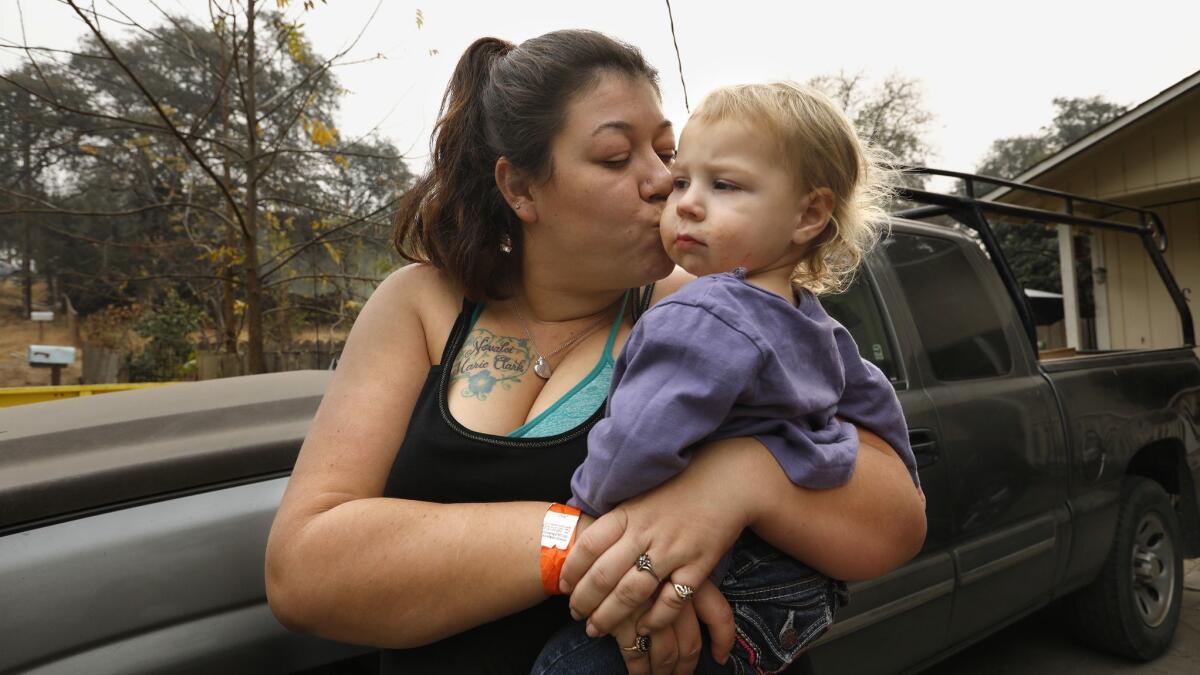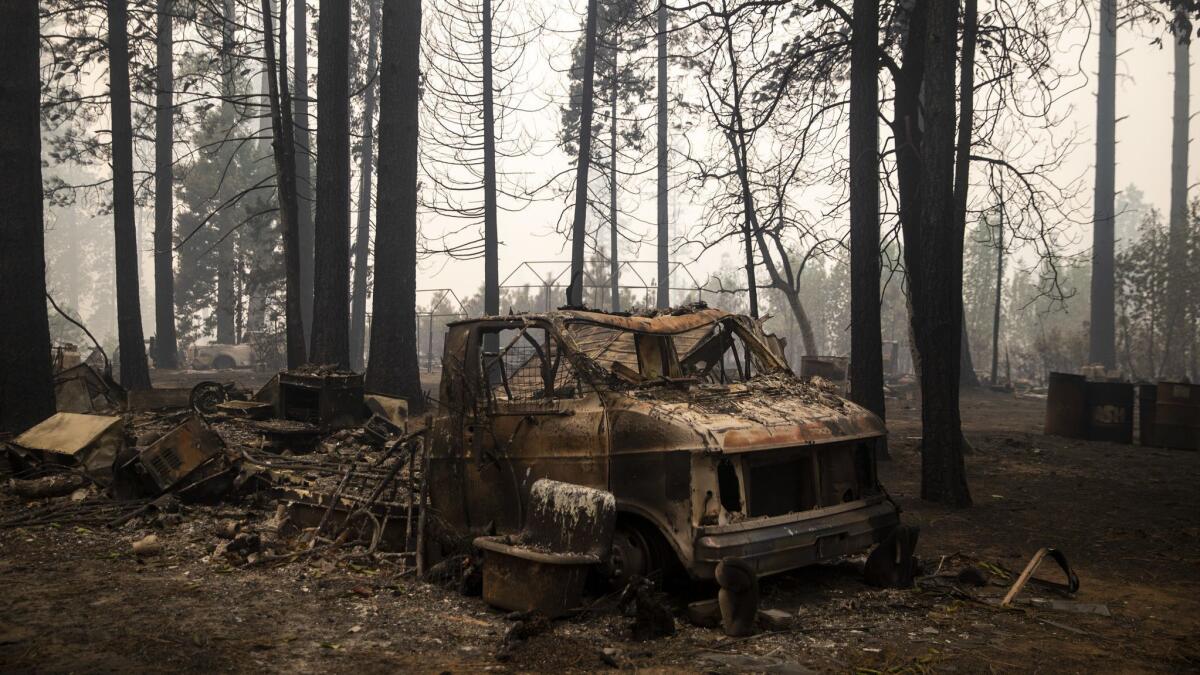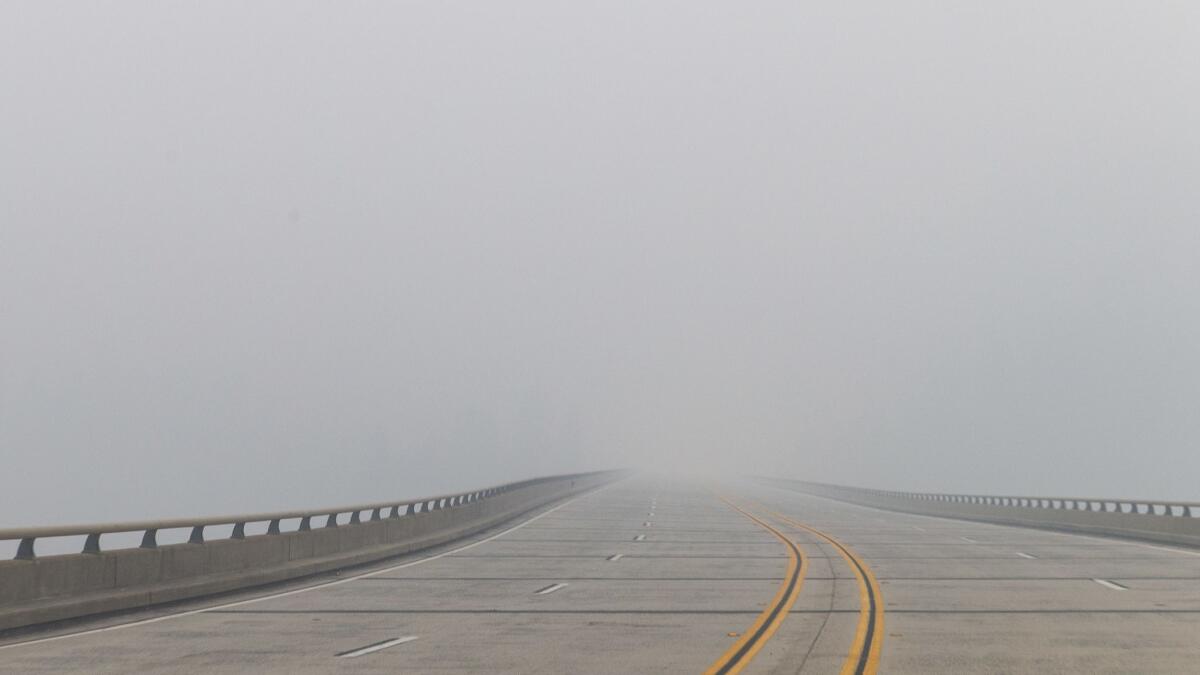California fires: The tiny community of Concow was hit hard by the Camp fire. Residents hope they’re not forgotten

- Share via
Reporting from Concow, Calif. — It’s easy to drive right past Concow on Highway 70 here in the Sierra Nevada foothills.
Some 700 or so people live on dirt and gravel roads that snake deep into a forest of pine. Many have been here for generations. There are artists and retirees, veterans, loggers and marijuana growers. There are people living off the grid and others who just couldn’t resist the fishing in scenic Concow Reservoir and the friendly, if far off, neighbors.
The Camp fire burned most of Concow’s homes to the ground.
Much attention has been paid to Paradise, the much larger nearby town of 27,000 people, where the fire destroyed thousands of homes and killed dozens of people. But in the midst of an enormous disaster, tiny Concow hopes it’s remembered.
“It feels like we are being ignored. Completely ignored,” said Megan Butler, 26, of Concow. “Maybe it’s just a lot of confused people or maybe because we’re so close to Paradise that they consider it all the same.
“But it’s Concow. It’s my home.”
LIVE UPDATES: Latest on the California fires »
The death toll has risen every day since the fire broke out Nov. 8 near Camp Creek Road in Butte County. As of Saturday, authorities had confirmed 71 deaths. Of those, eight bodies have been found in Concow — three in homes, three outdoors, two in vehicles.
Among those the Butte County Sheriff’s Office has identified as dead is 48-year-old Jesus Fernandez of Concow. A family friend wrote that he was a loving father and “tireless provider.”
A drive through Concow — which is named after the Konkow Maidu American Indians — now is a journey through an ashen hellscape. The top portions of power poles that burned from the bottom are still attached to electrical wires and hang over the roads. Smoke rises from the ground. Charred vehicles are marked with spray-painted Xs to show that they’ve been checked for the dead.
Nothing is left of the dozens of houses in the Camelot subdivision, a gated community where people lived closer together.
The grassy campground at Concow Reservoir that regularly hosts music, arts and ancestral festivals is now a ghostly site. This week, a pair of chairs was neatly arranged around a fire pit, but only their frames remained.

The good news is that the only store in town, Canyon Lakes Market, a local institution called the Dome because of its large round roof, is still standing.
So, too, is Concow Elementary School, which was untouched by flames while everything around it is charred. A wall surrounding the campus is covered in the painted murals of elementary classes. One, from 2008 — the year another fire tore through Concow — depicts an eagle and flames and the words “Memories That Burn On Forever.”
Capt. John Gaddie, California Department of Forestry and Fire Protection spokesman, said the Camp fire was the fourth blaze he had worked on in the area since 1999. He was driving last week along the back roads, using a tablet computer to map properties that were damaged.
“It’s pretty bad,” he said. “It’s the worst I’ve seen.
“But the thing about this community is they’re really resilient,” he added. “They will come back.”
Some families have been here for decades, he said, passing down property from one generation to another.
Butte County Supervisor Bill Connelly, who represents Concow and pushed for federal funding for residents to rebuild after the 2008 fire, said residents feel overlooked in light of the fire’s devastation in Paradise and nearby Magalia, a town of 11,000 people.
“Those are huge tragedies,” Connelly said in an interview. “Not to take away from that,” but Concow residents “are upset and feel left out.”
At a town hall meeting this week in Oroville, a woman angrily asked fire officials why Concow wasn’t being discussed more at public gatherings and in the media.
“I mean, they got destroyed just as bad as Paradise,” she said. Were people overlooking the community “just ’cause it’s all hillbillies and stuff and trailers and not, like, retirement people?”
Tony Karsten and his wife, Willow, lived off a bend of Hog Ranch Road, a dirt road. They loved the seclusion, living behind a gate with a “Keep Out” sign.
A black bear sometimes traipsed through their yard at night and poked around their outdoor ice box, said Willow, 53. She kept an herb garden with rosemary and sage, and the couple got their eggs from a man they called Chicken Bob because he had so many chickens.
“It’s a hippie community living off the land,” Tony said.
Tony, 46, who is on disability, said there are so many people in Concow named Tony that he adopted the moniker “Hillbilly Tony” to differentiate himself.
As the flames erupted, the Karstens fled the mountain in their 1989 Oldsmobile, hearing the explosion of propane tanks all around them. Two of their five dogs are gone. Now, they’re staying in an Oroville hotel, waiting to figure out what’s next.
On their property this week, flames still licked at a charred tree stump in the driveway. The recreational vehicle they lived in had been reduced to its metal frame.
Next door, the house of Matt and Donna Montgomery was a crumpled pile of blackened debris. Nearby was a floor mat that read, “Wipe your paws.”
Matt Montgomery, 59, said he served in the military in Afghanistan and has post-traumatic stress disorder.
“That’s why I live up here, because it’s calmer and there’s not a lot of people around,” he said.
For California fire victims, it will be a long, tough road to rebuild »
The 2008 fire burned their home, too, he said. They rebuilt, and there was one silver lining: “We had wildflowers that we never had before,” Donna Montgomery said.
Butte County Treasurer-Tax Collector Peggy Moak also lives in Concow, on 50 acres of land with goats and cattle. As the fire leveled the community, she used a hose to water fields and bushes on the perimeter of her property to protect her house and other homes.
She helped care for a 90-year-old man who survived the flames by wading into Concow Reservoir, she said. He was brought to her house, where he was given new clothes and stayed the night.
Moak described Concow as a “a close-knit community, especially after the 2008 fire when we all pulled together.”
Megan Butler lived with her husband and two young daughters in a two-bedroom modular house with a wraparound deck on Big Bend Road. They had just built a huge chicken coop.

On Nov. 8, Butler took her 5-year-old daughter, Novalei, to Concow Elementary. When she got there, the school had no power and staff told her it was being evacuated.
She rushed home and packed. Novalei grabbed clothes. Two-year-old Aurora put baby dolls in trash bags. They drove out as fast as they could.
The next day, she managed to visit her destroyed house. Parts of it were still aflame.
Butler’s mom and grandmother both went to Concow Elementary, and her grandmother’s house has been a constant in her life.
“I don’t think I’m going to get to go back to Concow,” said Butler, who is staying with family in Oroville. “There’s nothing up there for me right now.”
She paused and took a breath.
“This is really starting to upset me…. My grandma’s has been there my entire life. Right there. All my dogs are buried there. It’s everything. My kids had rooms there. It just really sucks.”
Butler said she and her husband disagree over whether to rebuild. He wants to. She doesn’t.
Novalei, she said, has been crying for days. She wants to go home.
Twitter: @haileybranson
Twitter: @dakotacdsmith
UPDATES:
7:45 a.m.: This article was updated with the latest Camp fire death toll.
This article was originally published at 4 a.m.
More to Read
Sign up for Essential California
The most important California stories and recommendations in your inbox every morning.
You may occasionally receive promotional content from the Los Angeles Times.












